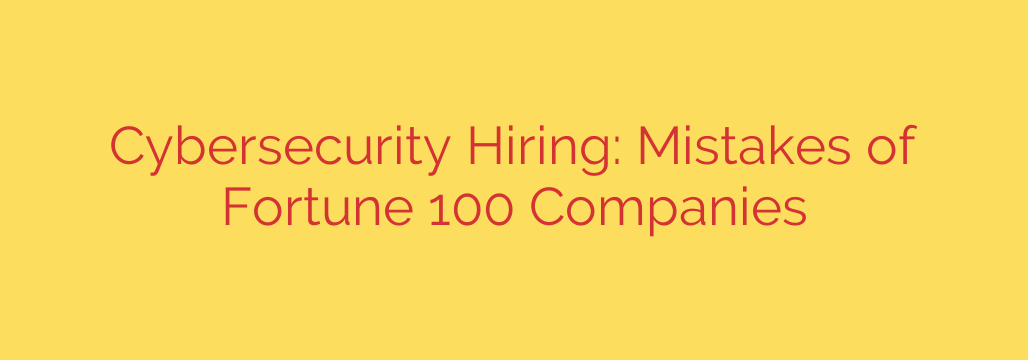
Cybersecurity Hiring: Are You Making These Costly Mistakes?
In today’s digital landscape, the demand for skilled cybersecurity professionals has never been higher. Yet, even the world’s most successful companies consistently struggle to attract and retain the right talent. The cybersecurity talent gap is real, but it’s often widened by flawed hiring strategies that reject qualified candidates and leave critical security roles unfilled.
The consequences of a weak security team are severe, ranging from data breaches to significant financial and reputational damage. To build a resilient defense, organizations must first fix the fundamental process of how they hire. Many common recruiting practices are outdated and counterproductive, particularly in a field as dynamic as cybersecurity.
Here are the most common—and damaging—mistakes companies make in cybersecurity hiring, along with actionable advice to build a stronger team.
1. The Quest for the “Unicorn” Candidate
One of the most frequent errors is writing an impossible job description. These postings often demand a candidate who is an expert in everything: penetration testing, cloud security, compliance, incident response, and application security, all at once. They typically require a laundry list of expensive certifications (CISSP, CISM, OSCP) and ask for ten years of experience with a technology that has only existed for five.
This “unicorn hunting” immediately discourages talented specialists who may be perfect for the core responsibilities of the role but don’t check every single box. It creates a situation where the only people who apply are either unqualified or overconfident.
How to fix it: Focus your job description on the three to five core skills essential for the position. Differentiate between “must-have” requirements and “nice-to-have” preferences. Be realistic about experience levels and prioritize practical ability over a long list of credentials.
2. Over-reliance on Certifications and Keywords
While certifications demonstrate a baseline of knowledge, they are not a substitute for hands-on experience and critical thinking. Many highly skilled security professionals—especially those from non-traditional backgrounds—prove their expertise through practical application rather than exams.
Unfortunately, many HR departments and automated screening systems are programmed to filter resumes based on specific keywords and certifications. This means that a brilliant self-taught ethical hacker or a developer with deep security knowledge might be instantly rejected by an algorithm simply because their resume lacks the “right” acronyms.
How to fix it: Involve technical security staff in the initial screening process. Teach recruiters to look beyond keywords and identify resumes that demonstrate project work, contributions to open-source tools, or detailed descriptions of real-world problem-solving.
3. A Disconnected and Inefficient Interview Process
The cybersecurity community is small, and a company’s reputation spreads quickly. A long, disorganized, or disrespectful interview process is a guaranteed way to lose top talent. Candidates often face multiple rounds of interviews with people who don’t understand the role, are asked irrelevant “gotcha” questions, or are left waiting for weeks without communication.
In a high-demand market, the best professionals have multiple offers. They will not wait around for a company that doesn’t respect their time or expertise. The interview should be a two-way street—a chance for you to assess them and for them to assess your company’s security maturity and culture.
How to fix it: Streamline your interview process to be concise and effective. Ensure every interviewer has a clear purpose. Replace abstract puzzles with practical, hands-on challenges that simulate real job tasks, such as analyzing a packet capture, reviewing a piece of code for vulnerabilities, or outlining an incident response plan.
4. Ignoring Essential Soft Skills
Technical prowess is vital, but it’s only half the equation. A senior cybersecurity analyst or leader must be able to communicate complex risks to non-technical stakeholders, collaborate with development teams, and write clear, concise reports for executives.
Many hiring processes focus exclusively on technical validation and completely neglect to assess a candidate’s communication, collaboration, and business acumen. This leads to hiring brilliant technicians who are unable to function effectively within a team or advocate for necessary security investments. A security expert who cannot explain risk to the board is ineffective.
How to fix it: Dedicate a portion of the interview to assessing soft skills. Ask behavioral questions like, “Describe a time you had to explain a complex vulnerability to a non-technical manager,” or “How would you handle a disagreement with a developer about a security requirement?”
Building a Winning Cybersecurity Hiring Strategy
Securing your organization starts with securing the right people. Moving away from these common mistakes requires a strategic shift in how you view talent acquisition.
- Prioritize Aptitude Over Credentials: Look for candidates who demonstrate a passion for learning, strong problem-solving skills, and a security-first mindset.
- Invest in Internal Talent: Don’t overlook skilled employees in your IT or software development departments. With targeted training, upskilling an existing employee who already knows your business can be far more effective than hiring externally.
- Create a Positive Candidate Experience: Treat every applicant with respect. Provide timely feedback and ensure the interview process is a valuable and relevant challenge.
- Offer Competitive Compensation and Growth: Understand the market rate for security talent and offer a package that includes not just salary but also opportunities for training, conference attendance, and career advancement.
Ultimately, hiring for cybersecurity is not just an HR task—it is a critical security function. By refining your approach, you can stop searching for mythical unicorns and start building a team of real-world defenders capable of protecting your most valuable assets.
Source: https://www.helpnetsecurity.com/2025/07/17/cybersecurity-hiring-trends-2025/








